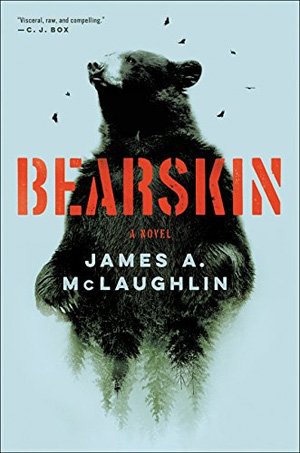 Written by James A McLaughlin — For his debut, James A McLaughlin provides an interesting spin on rural noir, itself an increasingly popular genre. Rather than focusing on the drama arising from conflict within poor rural communities, McLaughlin makes his protagonist an outsider. Rice is a man in his 30s with a background in biology and who is working as a caretaker on a private wildlife reserve in the Appalachian Mountains. It’s a job that sometimes brings him into conflict with local hunters.
Written by James A McLaughlin — For his debut, James A McLaughlin provides an interesting spin on rural noir, itself an increasingly popular genre. Rather than focusing on the drama arising from conflict within poor rural communities, McLaughlin makes his protagonist an outsider. Rice is a man in his 30s with a background in biology and who is working as a caretaker on a private wildlife reserve in the Appalachian Mountains. It’s a job that sometimes brings him into conflict with local hunters.
But Rice has a hidden past that involves Mexican drug cartels. This makes his dealings with the poachers both easier and more difficult. His familiarity with and capacity for violence – the novel’s opening scene involves him fighting off two gang members in a Mexican prison – means he is not intimidated by poachers, most of whom are also involved in the meth business and affiliated to biker gangs. However, Rice fears for his life. Before leaving Mexico he avenged the killing of his girlfriend Apryl, and in doing so has made a deadly enemy. While his murder of a young Sicario (a hitman with cartel ties) happened with the blessing of the cartel, the victim’s elder brother, Angel Delgado, who has a fearsome reputation, is not so forgiving. Rice moved to Virginia in order to slip off the grid, and any action he takes which could lead to law enforcement involvement, such as being arrested or filing a complaint, could lead to his discovery.
This is the conflict at the heart of the narrative. Rice is led by a local up the mountain to a bear carcass. The paws have been cut off and the gall bladder removed. Around the carcass are signs of poaching; tracks in the grass and a bag of rotting fruit used to lure the bear to his death. Rice knows becoming involved is a risk, but such casual butchery is too offensive to ignore. He can’t report the crime, either to the police or the game warden, and so is forced to begin his own investigation. Discreet inquiries lead nowhere so he confronts the poachers in their own homes and faces off gangs in biker bars. Such drama brings unforeseen scrutiny from DEA Agent Johns, and consequently a violent encounter with the person he least wanted to see.
The violence in Bearskins is sudden, brutal, and frequently definitive. Rice’s fight in the forest bordering his cabin, with a poacher on a mountain bike armed with a crossbow, is particularly visceral.
However well written, it’s not necessarily the thriller elements that will stay with you. Bearskins is a joyous celebration of nature, and McLaughlin fills his novel with vivid descriptions of the local flora and fauna. He is particularly good at conveying the awe-inspiring effect of being alone in the wild; how, when free from human presence or interference, it thrives and blossoms. I keep going back to the scenes where Rice is overwhelmed by his experiences. He enters a kind of dissociative state repeatedly when in the mountains, of which he has no recollection, and which are as much due to the environment’s effect upon him as any past trauma.
The author is equally good at characterisation. You will feel the conflict in Rice between his educated, civilised self and his more primitive, violent side. Equally compelling are the portraits of his predecessor, Sara, who is recovering from sexual assault, and Alan Mirra, Johns’ confidential informant within the biker gang.
Bearskins is a fine thriller with strong literary aspects for anyone looking for more than action, and a hell of a debut.
For more rural or Southern noir, check out this feature on grit lit, or take a loot at our reviews of Tomato Red, Bull Mountain, and The Dry.
Ecco
Print/Kindle/iBook
£11.99
CFL Rating: 5 Stars









